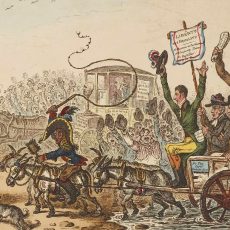Oct
1812
liverpool
Contested
GENERAL ELECTION
In the general election of Oct 1812, 2797 people voted. There were 5 candidates, with George Canning I & Isaac Gascoyne elected.
Poll book data from:
Citation: A correct account of the poll… (Liverpool: Wright & Cruickshank, [1812])
Source: John Sims (ed.), A Handlist of British Parliamentary Poll Books (Leicester, 1984); Jeremy Gibson and Colin Rogers (eds.), Poll Books, 1696–1872: A Directory of Holdings in Great Britain (4th edn., Bury, 2008).
Timeline & Key Statistics
Contexts & Remarks
- In 1812 five candidates went to the poll: George Canning, Isaac Gascoyne, Henry Peter Brougham, Thomas Creevey, and Banastre Tarleton. An uneasy alliance developed between the two Tories of Gascoyne, who continued as the corporation's candidate and supported the government, and Canning, who took over Tarleton's independent interest, and had refused the position of Foreign Secretary in the Liverpool Administration. Brougham and Creevey stood jointly for the Whigs. Tarleton, meanwhile, was dropped by his supporters after quarrelling with the government, and only received a handful of votes. The appearance of political heavyweights of the stature of Canning and Brougham helped to raise the political excitement to a fever pitch and drew sustained national attention.
- The contest was characterised by endless speeches and tours of the town's various political clubs. On 16 October the Whigs retired from the contest with 150 votes unpolled. The victors had outspent their rivals by £20,000 to £8,000, allegedly paying 20?30 guineas for votes.
- On 10 October, after three days of polling, William Roscoe, who managed the Whig campaign, wrote to Thomas Attwood requesting that a subscription be opened in Birmingham to support the trailing Brougham and Creevey, since they would not only be representatives of Liverpool but 'advocates of peace, and the firm supporters of the manufacturing and mercantile interests of every part of the country'. Attwood declined, citing a lack of funds and an unwillingness in Birmingham to send money to the 'opulent and wrongheaded Corporation' of Liverpool. (Liverpool Archives, 920 ROS/152?3).
- The poll book is arranged so that 'Vote 1', on the left-hand side of the votes column, indicates at which bar the vote was cast (i.e. if an elector's votes reads 'C G' it means that they voted for Canning and Gascoyne at the bar of Canning.
- Tarleton submitted a petition to the House of Commons alleging bribery and corruption against Canning and Gascoyne, and foreclosure of the poll, but the select committee which tried the petition ruled in favour of Canning and Gascoyne. (CJ, lxviii, 51?2, 272).
People & Places
Poll Book
Below is a digitised version of the poll book for this election:



